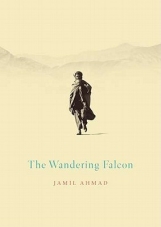The Wandering Falcon
Jamil Ahmad
|
|
Four decades ago, a rangy civil servant in charge of overseeing the forested ridges and brick-hut villages of Pakistan’s Swat Valley sought a pastime to get through slow days. He dabbled in poetry, composing haiku in longhand. His wife read the poems and called them “rubbish.”
“Why don’t you write about something you know?” Jamil Ahmad recalled his wife, Helga, telling him. She said his focus should be the tribes of Pakistan’s northwest frontier, where Ahmad had worked for 15 years. He thought, “That makes sense.” For the next two years, Ahmad worked on his novel. He hewed his characters from the tribal badlands, where Pashtun society has always been demarcated by strict codes of honor, yet where the region’s remoteness and anarchic economy made smuggling, snitching and kidnapping routine occupations. He wrote about the harsh beauty of the Baluch desert, the stoning of adulterers, and a market where men shopped for women with the casualness of browsing for furniture. Thirty-eight years would pass before the publication of “The Wandering Falcon,” a collection of interwoven stories that is quickly making the 80-year-old retired bureaucrat Pakistan’s unlikeliest literary star. Written long before the emergence of the Taliban, “The Wandering Falcon” moves far beyond the Western media’s stereotypical depiction of the tribal areas and lays bare the nature of a place that is now a focal point of U.S. and European foreign policy. Ahmad brings a different vista to the literary landscape of a country known to the West mainly as Al Qaeda’s post-Sept. 11 sanctuary and home to a volatile mix of Islamic militant groups. “Part of the immersive power of the book comes from Ahmad’s ability to combine a clear affection and respect for this world of tribal discipline with a clear-eyed look at its harshness,” Pakistani author Kamila Shamsie wrote in a review in Britain’s Observer newspaper last month after the book’s release in Europe. “This is not a book in which a central protagonist will walk down a path and invite the readers to follow him, narrative and personality cohering around him along the way,” Shamsie wrote. “Instead, it is a book of glimpses into a world of strict rules and codes, where the individual is of far less significance than the collective.” Dressed all in khaki and seated in an armchair at his Islamabad home, Ahmad exudes an energy that belies his years. Wisps of white hair top his head and his sun-weathered face is long with age, but he spryly moves from anecdote to anecdote in meticulous detail. His sleepy green eyes widen as he explains how his fascination with tribal life began, when as a boy in British India’s Punjab plains he excitedly leafed through stacks of books about tribes of all stripes: North America’s Indians, the bands of West Africa, the clans of the Scottish Highlands. “I had an interest in the tribes per se, even in school,” Ahmad said between cigarette puffs. “So that acted as a catalyst. I developed this interest early. And when I was selected for the civil service, you were given a choice where to serve. And my first choice was what was called the frontier list.” Stretching from the snowcapped peaks of the Hindu Kush down to the desert flats of northern Baluchistan, Pakistan’s frontier for centuries has been home to the Pashtun, a proud tribal people with a history of resistance to foreign occupation, be it Britain’s 19th century colonial exploits or the Soviet invasion of Afghanistan in the 1980s. Taliban militants waging war with the U.S. in Afghanistan are ethnic Pashtuns. Pashtuns adhere to a code of conduct known as Pashtunwali. Besmirched honor must be avenged. Sanctuary must be given to anyone who asks for it. Hospitality to visitors isn’t an option; it’s a commandment. Once exposed to Pashtunwali, Ahmad was deeply moved. “I felt the tribes had far more grace, a far greater sense of honor, rectitude, truth — the qualities we associate with a decent human being — than you found in the cities,” Ahmad said. (Pakistan’s unlikely storyteller of the Swat Valley, L.A. Times, 26-Sept-2011) Reviews |

